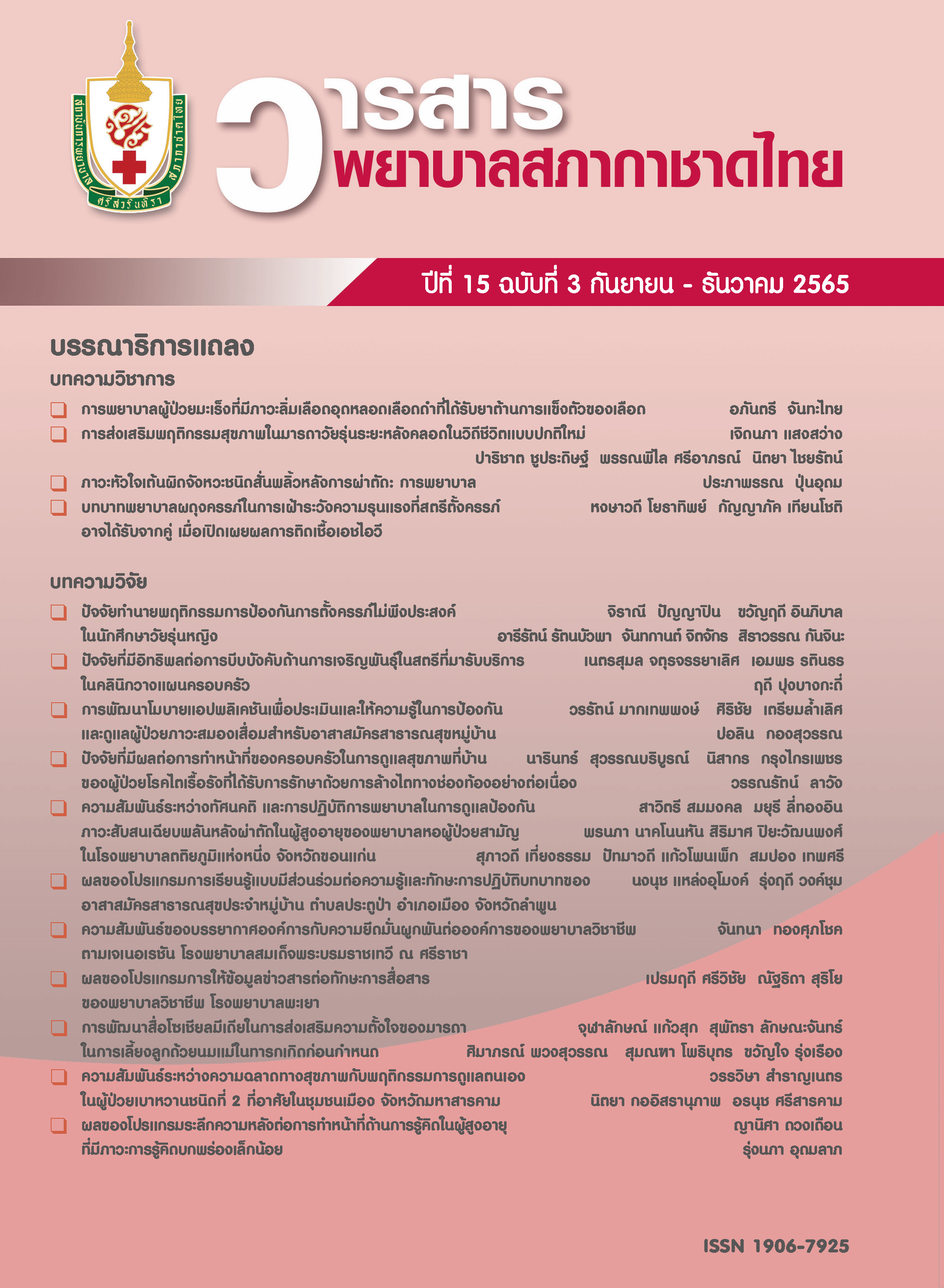Effects of a Participatory Learning Program on the Knowledge and Skills of Practical Roles Among Village Health Volunteers in Pratupa Subdistrict, Muang, Lamphun
Keywords:
knowledge, skills of practical roles, participatory learning program, village health volunteersAbstract
The purpose of this quasi - experimental research, with one group pretest - posttest design, was to examine the effects of a participatory learning program on the knowledge and skills of practical roles among village health volunteers in Pratupa sub - district, Muang, Lamphun. Thirty samples were purposively selected to participate in the learning program. The participatory learning program consisted of a pretest (week 1), attending three learning sessions, including Session 1 (sharing experiences and reflecting on the roles of village health volunteers), Session 2 (teaching with demonstration by learning step - by - step with practice following each step), and Session 3 (the conclusion session). The instruments included the participatory learning program and evaluation forms of the village health volunteers’ knowledge and skills of practical roles. The data were analyzed using frequency, percentage, mean, standard deviation, McNemar’s test, Chi - squared test, and one - way repeated measures ANOVA.
The results showed that after implementing the program (in weeks 3 and 8), the levels of knowledge were not significantly different, whereas the levels of skills of practical roles were significantly different from those before participating in the program at p < .05. Moreover, the scores of knowledge and skills of practical roles were statistically different from those before participating in the program at p < .001.
Therefore, stakeholders should apply the participatory learning program for village health volunteers in order to improve their knowledge and skills of practical roles to increase effectiveness in developing village health volunteers’ capacity to solve the health problems facing communities.
References
Design and Construction Division, Department of Health Service Support, Standard and Design. Guideline Primary Care Unit 2015. Nonthaburi: Ministry of Public Health; 2015. (in Thai)
Yaebkai Y. Wongsawat P. Main role performances of village health volunteers. Journal of Phrapokklao Nursing College 2020;31(2):269-79.
Department of Disease Control. Noncommunicable diseases Report; DM HT and relevant factors A.D. 2019. Bangkok: Aksorn Graphic and Design Publishing Limited Partnership; 2020. (in Thai)
Strategy and Planning Division, Ministry of Ministry of Public Health. Public health statistics A.D. 2020. Nonthaburi: Office of Policy and Strategy, Bureau of Ministry of Public Health; 2021. (in Thai)
Chuengsatiansup K, Suksut P. Health volunteers in the context of changes: potentials and developmental strategies. Nonthaburi: Office of Policy and Strategy, Bureau of Ministry of Public Health; 2009. (in Thai)
Sanprasan P, Wattradul D, Jamsomboon K, Puapairoj V, Techangkul L, Yuyuen Y. Effects of health volunteer’s capacity building based on participating learning program on knowledge and skill of caring patients with cardiovascular disease and a risk group of cardiovascular disease. Thai J Cardio-Thorac Nurs 2015;26(1):119-32. (in Thai)
Wicha P. Effectiveness of implementing participatory learning program of breast self-examination among inmate volunteers in Chiangmai woman correctional institution [Thesis]. Chiang Mai: Chiang Mai University; 2013. (in Thai)
Division of Non-Communicable Disease, Lamphun Provincial Health Office. Number of Non-Communicable Disease, Lamphun province A.D. 2012-2014: NCDs Statistics in Pratupa Sub-District Health Promoting Hospital [Report]. Lamphun: Lamphun Provincial Health Office; 2014. (in Thai)
Lamphun Provincial Health Office. Tuberculosis prevention and control surveillance report, Lamphun province [Report]. Lamphun: Lamphun Provincial Health Office; 2019. (in Thai)
Petmaneechote K, Pongpumma L, Arunkeeree A, Taowalanon P. Effectiveness of participatory learning program on knowledge and practice of village health volunteers for taking care of hypertension patients. Nursing Journal of the Ministry of Public Health 2021;31(3):28-41. (in Thai)
Department of Mental Health. Participatory learning curriculums [Internet]. 2000 [cited 2015 Dec 22]. Available from: http://mhtech.dmh.moph.go.th/techno/techno_other/ index.html. (in Thai)
Department of Health Service Support. Standardized training curriculums for village health volunteers A.D. 2012. Nonthaburi: Primary Health Care Division, Ministry of Public Health; 2012. (in Thai)
Srisatidnarakul B. The methodology in nursing research. 6th ed. Bangkok: U&I Intermedia; 2012. (in Thai)
Jiemjuejun W, Kanjanawetang J, Hoontrakul D, Prachanban P. The Effects of the participatory learning program on knowledge and health behaviors of using NSAIDs among labour. Journal of Nursing and Health Sciences 2011;5(2):34-44. (in Thai)
Department of Mental Health. Participatory learning management guideline. 4th ed. Bangkok: Wongkamol Production; 2001. (in Thai)
Srikhrueadam P, Lapvongwatana P, Chansatitporn N. Effects of capacity building for breast self-examination of female health volunteers in Surin’s communities. J Pub Health Nurs 2013;27(3):71–82. (in Thai)
Khammani T. Education science: knowledge for efficiently learning. 21st ed. Bangkok: Chulalongkorn University Press; 2017. (in Thai)
Downloads
Published
Issue
Section
License
Copyright (c) 2023 Srisavarindhira Thai Red Cross Institute of Nursing

This work is licensed under a Creative Commons Attribution-NonCommercial-NoDerivatives 4.0 International License.
เนื้อหาบทความหรือข้อคิดเห็นต่างๆ ในวารสารพยาบาลสภากาชาดไทยนี้ เป็นความคิดเห็นของผู้เขียนบทความ ไม่ใช่ความเห็นของกองบรรณาธิการ หรือสถาบันการพยาบาลศรีสวรินทิรา สภากาชาดไทย





